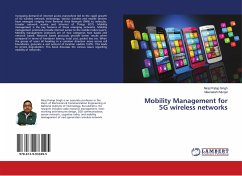
Study of Proxy Mobile IPv6
Proxy Mobile
Versandkostenfrei!
Versandfertig in 6-10 Tagen
27,99 €
inkl. MwSt.

PAYBACK Punkte
14 °P sammeln!
A network-based mobility management protocol called Proxy Mobile IPv6 (PMIPv6) is being actively standardized by the IETF NETLMM working group, and is starting to attract considerable attention among the telecommunication and Internet communities. Unlike the various existing protocols for IP mobility management such as Mobile IPv6 (MIPv6), which are host-based approaches, a network-based approach, PMIPv6 has salient features such as support for unmodified mobile nodes, support for both IPv4 and IPv6, efficient use of wireless link and improved handover performance. In this thesis, we have expl...
A network-based mobility management protocol called Proxy Mobile IPv6 (PMIPv6) is being actively standardized by the IETF NETLMM working group, and is starting to attract considerable attention among the telecommunication and Internet communities. Unlike the various existing protocols for IP mobility management such as Mobile IPv6 (MIPv6), which are host-based approaches, a network-based approach, PMIPv6 has salient features such as support for unmodified mobile nodes, support for both IPv4 and IPv6, efficient use of wireless link and improved handover performance. In this thesis, we have explained the architecture of PMIPv6 with its detailed signaling diagram. We have compared PMIPv6 with MIPv6 in term of some characteristics and performance aspects and identified some drawbacks of PMIPv6. We have also presented handover latency calculation of MIPv6, HMIPv6 and PMIPv6 based on an analytical model. The results show that PMIPv6 has superior performance to other two protocols(MIPv6and HMIPv6).












